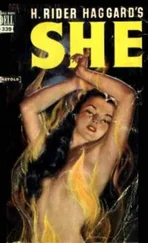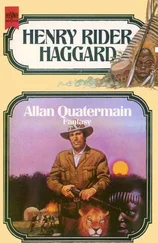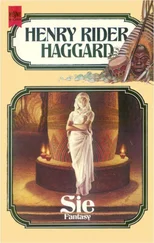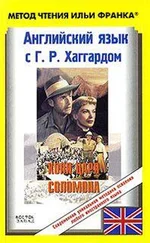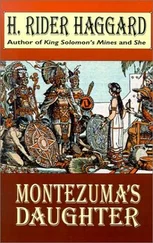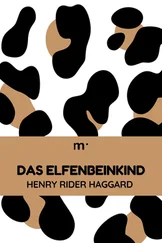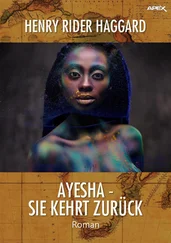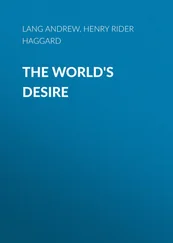“Now then,” I whispered, “mind you don’t miss.”
“Miss!” he whispered back contemptuously; “I could not miss it if I tried.”
He lifted the rifle, and the roan-coloured buck, having drunk his fill, raised his head and looked out across the river. He was standing right against the sunset sky on a little eminence, or ridge of ground, which ran across the swamp, evidently a favourite path for game, and there was something very beautiful about him. Indeed, I do not think that if I live to a hundred I shall ever forget that desolate and yet most fascinating scene; it is stamped upon my memory. To the right and left were wide stretches of lonely death-breeding swamp, unbroken and unrelieved so far as the eye could reach, except here and there by ponds of black and peaty water that, mirror-like, flashed up the red rays of the setting sun. Behind us and before stretched the vista of the sluggish river, ending in glimpses of a reed-fringed lagoon, on the surface of which the long lights of the evening played as the faint breeze stirred the shadows. To the west loomed the huge red ball of the sinking sun, now vanishing down the vapoury horizon, and filling the great heaven, high across whose arch the cranes and wildfowl streamed in line, square, and triangle, with flashes of flying gold and the lurid stain of blood. And then ourselves—three modern Englishmen in a modern English boat—seeming to jar upon and look out of tone with that measureless desolation; and in front of us the noble buck limned out upon a background of ruddy sky.
Bang! Away he goes with a mighty bound. Leo has missed him. Bang! right under him again. Now for a shot. I must have one, though he is going like an arrow, and a hundred yards away and more. By Jove! over and over and over! “Well, I think I’ve wiped your eye there, Master Leo,” I say, struggling against the ungenerous exultation that in such a supreme moment of one’s existence will rise in the best-mannered sportsman’s breast.
“Confound you, yes,” growled Leo; and then, with that quick smile that is one of his charms lighting up his handsome face like a ray of light, “I beg your pardon, old fellow. I congratulate you; it was a lovely shot, and mine were vile.”
We got out of the boat and ran to the buck, which was shot through the spine and stone dead. It took us a quarter of an hour or more to clean it and cut off as much of the best meat as we could carry, and, having packed this away, we had barely light enough to row up into the lagoon-like space, into which, there being a hollow in the swamp, the river here expanded. Just as the light vanished we cast anchor about thirty fathoms from the edge of the lake. We did not dare to go ashore, not knowing if we should find dry ground to camp on, and greatly fearing the poisonous exhalations from the marsh, from which we thought we should be freer on the water. So we lighted a lantern, and made our evening meal off another potted tongue in the best fashion that we could, and then prepared to go to sleep, only, however, to find that sleep was impossible. For, whether they were attracted by the lantern, or by the unaccustomed smell of a white man for which they had been waiting for the last thousand years or so, I know not; but certainly we were presently attacked by tens of thousands of the most blood-thirsty, pertinacious, and huge mosquitoes that I ever saw or read of. In clouds they came, and pinged and buzzed and bit till we were nearly mad. Tobacco smoke only seemed to stir them into a merrier and more active life, till at length we were driven to covering ourselves with blankets, head and all, and sitting to slowly stew and continually scratch and swear beneath them. And as we sat, suddenly rolling out like thunder through the silence came the deep roar of a lion, and then of a second lion, moving among the reeds within sixty yards of us.
“I say,” said Leo, sticking his head out from under his blanket, “lucky we ain’t on the bank, eh, Avuncular?” (Leo sometimes addressed me in this disrespectful way.) “Curse it! a mosquito has bitten me on the nose,” and the head vanished again.
Shortly after this the moon came up, and notwithstanding every variety of roar that echoed over the water to us from the lions on the banks, we began, thinking ourselves perfectly secure, to gradually doze off.
I do not quite know what it was that made me poke my head out of the friendly shelter of the blanket, perhaps because I found that the mosquitoes were biting right through it. Anyhow, as I did so I heard Job whisper, in a frightened voice—
“Oh, my stars, look there!”
Instantly we all of us looked, and this was what we saw in the moonlight. Near the shore were two wide and ever-widening circles of concentric rings rippling away across the surface of the water, and in the heart and centre of the circles were two dark moving objects.
“What is it?” asked I.
“It is those damned lions, sir,” answered Job, in a tone which was an odd mixture of a sense of personal injury, habitual respect, and acknowledged fear, “and they are swimming here to heat us,” he added, nervously picking up an “h” in his agitation.
I looked again: there was no doubt about it; I could catch the glare of their ferocious eyes. Attracted either by the smell of the newly killed waterbuck meat or of ourselves, the hungry beasts were actually storming our position.
Leo already had his rifle in his hand. I called to him to wait till they were nearer, and meanwhile grabbed my own. Some fifteen feet from us the water shallowed on a bank to the depth of about fifteen inches, and presently the first of them—it was the lioness—got on to it, shook herself, and roared. At that moment Leo fired, the bullet went right down her open mouth and out at the back of her neck, and down she dropped, with a splash, dead. The other lion—a full-grown male—was some two paces behind her. At this second he got his forepaws on to the bank, when a strange thing happened. There was a rush and disturbance of the water, such as one sees in a pond in England when a pike takes a little fish, only a thousand times fiercer and larger, and suddenly the lion gave a most terrific snarling roar and sprang forward on to the bank, dragging something black with him.
“Allah!” shouted Mahomed, “a crocodile has got him by the leg!” and sure enough he had. We could see the long snout with its gleaming lines of teeth and the reptile body behind it.
And then followed an extraordinary scene indeed. The lion managed to get well on to the bank, the crocodile half standing and half swimming, still nipping his hind leg. He roared till the air quivered with the sound, and then, with a savage, shrieking snarl, turned round and clawed hold of the crocodile’s head. The crocodile shifted his grip, having, as we afterwards discovered, had one of his eyes torn out, and slightly turned over; instantly the lion got him by the throat and held on, and then over and over they rolled upon the bank struggling hideously. It was impossible to follow their movements, but when next we got a clear view the tables had turned, for the crocodile, whose head seemed to be a mass of gore, had got the lion’s body in his iron jaws just above the hips, and was squeezing him and shaking him to and fro. For his part, the tortured brute, roaring in agony, was clawing and biting madly at his enemy’s scaly head, and fixing his great hind claws in the crocodile’s, comparatively speaking, soft throat, ripping it open as one would rip a glove.
Then, all of a sudden, the end came. The lion’s head fell forward on the crocodile’s back, and with an awful groan he died, and the crocodile, after standing for a minute motionless, slowly rolled over on to his side, his jaws still fixed across the carcase of the lion, which, we afterwards found, he had bitten almost in halves.
Читать дальше

